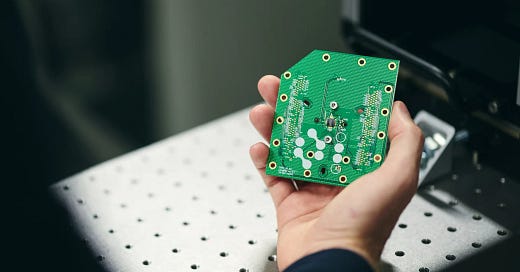Oxford Ionics Breaks Global Quantum Performance Records Without Error Correction
Oxford Ionics, a UK-based quantum computing company, has achieved a major breakthrough by demonstrating the highest performing quantum chip in the world, capable of being produced at scale in standard semiconductor fabrication plants. This milestone marks a significant step forward in the development of practical quantum computers.
The company’s patented Electronic Qubit Control system eliminates the need for lasers to control qubits, instead integrating everything needed into a silicon chip that can be mass-produced using existing manufacturing facilities and processes. Oxford Ionics’ chips have set industry records in both two-qubit gate and single-qubit gate performance, achieving fidelities of 99.97% and 99.9992%, respectively, without the need for error correction.
Dr Michael Cuthbert, Director of the UK’s National Quantum Computing Centre, praised the results, stating that they validate the scalability of the technology. Oxford Ionics’ co-founders, Dr Chris Ballance and Dr Tom Harty, attributed their success to a “rocket ship” approach, focusing on solving difficult challenges first. The company plans to build a scalable 256-qubit chip and has partnered with Infineon Technologies AG for R&D.
Breaking Quantum Performance Records with Scalable Trapped Ions
Oxford Ionics has achieved a significant milestone in the development of quantum computing technology, demonstrating the highest performing quantum chip in the world that can be produced at scale in a standard semiconductor fabrication plant. This breakthrough is attributed to their patented Electronic Qubit Control system, which eliminates the need for lasers to control qubits and integrates everything needed to control them into a silicon chip.
The company’s trapped ion-based quantum chips have set industry records in both two-qubit gate and single-qubit gate performance (fidelity) without using error correction. This is a significant achievement, as previous world records were achieved with the use of error correction to reduce errors in hardware. Oxford Ionics’ chips provide over twice the performance of previous records, using 10 times fewer qubits.
The high-performance qubits demonstrated by Oxford Ionics have fidelity levels of 99.97% for two-qubit gates and 99.9992% for single-qubit operations. This level of performance is crucial for building a useful quantum computer, as it enables the deployment of powerful quantum computers with far fewer qubits and reduces the need for complex and costly error correction techniques.
Scalability and Commercial Viability
Oxford Ionics’ approach to trapped ion-based quantum computing offers a scalable solution that can be manufactured on existing semiconductor production lines. This is in contrast to other approaches that require custom-built facilities or specialized equipment. The company’s technology has the potential to accelerate the development of commercial applications, making it an attractive option for industries looking to leverage the power of quantum computing.
The scalability of Oxford Ionics’ approach is further validated by their partnership with Infineon Technologies AG and their contract to produce Quartet, a full-stack quantum computer for the UK’s National Quantum Computing Centre. This partnership demonstrates the company’s ability to work with established industry players and deliver scalable solutions that meet the needs of commercial applications.
The Dawn of Useful Quantum Computing
The results achieved by Oxford Ionics mark a significant step forward in ion trap quantum computing, bringing the dawn of useful quantum computing closer than previously thought. With proven engineering and scalability, the company is now poised to build a 256-qubit chip that can be manufactured on existing semiconductor production lines.
Industry experts, such as Dr. Michael Cuthbert, Director of the UK’s National Quantum Computing Centre, have praised Oxford Ionics’ approach, stating that it has the potential to unlock new applications and algorithms. The company’s co-founders, Dr. Chris Ballance and Dr. Tom Harty, have expressed their confidence in their technology, citing its ability to deliver high-performance qubits without the need for error correction.
About Oxford Ionics
Oxford Ionics was co-founded in 2019 by Dr. Tom Harty and Dr. Chris Ballance, both of whom hold world records in quantum breakthroughs. The company has assembled a team of 55 global experts across physics, quantum architecture, engineering, and software, with plans to triple its headcount over the next three years as it scales internationally.
Oxford Ionics has raised £37 million in funding from investors including Braavos, OSE, Lansdowne Partners, Prosus Ventures, 2xN, and Hermann Hauser (founder of chip giant ARM).
More information
External Link: Click Here For More




